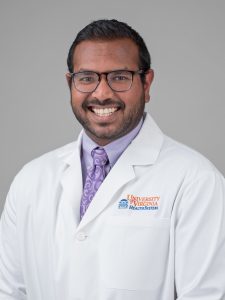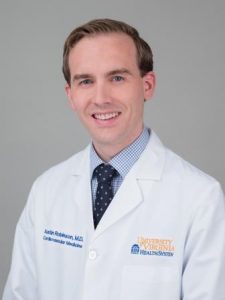
Milan Kahanda MD was nominated for the “Exemplary Professional Resident Physician Award” as part of the UVA Nursing Excellence Awards. This nomination is an acknowledgement of his team leadership and excellent inter-disciplinary relationships. He was honored at their ceremony last evening.

Austin Robinson MD, fellow on UVA’s NIBIB-funded Advanced Cardiovascular Imaging T32 grant, was funded 80K by the Ivy Foundation for his project supervised by Christopher Kramer MD (Cardiology) and John Hossack PhD (Biomedical Engineering) entitled Therapeutic Ultrasound for the Treatment of Degenerative Mitral Stenosis. He plans to develop a noninvasive, ultrasound-based therapy for calcific mitral stenosis in a bench-to-bedside manner.
Clinical Fellowship in Cardiovascular Disease
The goal of the Clinical Fellowship in Cardiovascular Disease is to instruct fellows in evidence-based prevention, diagnosis, and management of patients with a wide variety of acute and chronic cardiovascular conditions. Our training reflects the standards of the American Board of Internal Medicine, the American College of Cardiology, and the Accreditation Council for Graduate Medical Education (ACGME) program requirements for residency education in cardiovascular disease.
We offer two pathways for completing an ACGME-accredited cardiovascular disease fellowship. The four-year research/clinical program is designed for fellows who want to pursue a career in academic medicine as physician-scientists. The three-year clinical training program is geared towards those who want careers as cardiologists in private practice; fellows are encouraged to undertake shortened research projects in their areas of interest.
All fellows participate in a world-class outpatient clinic during at least three of their four years. Fellows are matched with a team of attendings, nurses, and administrative support personnel with whom they remain throughout their training.
Cardiovascular disease fellows may continue their training at UVA with advanced fellowships in six different subspecialties. More information on these programs can be found here.
All training programs are conducted at a single hospital location with state-of-the-art facilities and educational opportunities, among a collegial group of faculty who are committed to the teaching mission.
Cardiovascular Imaging
UVA’s advanced fellowship in cardiovascular imaging trains fellows in the use of cutting-edge technology that in turn facilitates a better understanding of the mechanisms of heart disease and of cardiac physiology and pathophysiology.
Specific program goals include:
• providing competence in technical aspects of imaging;
• providing competence in cardiac physiology and pathophysiology
• studying and developing innovative methods of imaging.
The Advanced Cardiovascular Imaging Fellowship Program is supported by a training grant from the National Institute of Biomedical Imaging and Bioengineering (NIBIB).
Austin Robinson MD, fellow on the NIBIB-funded Advanced Cardiovascular Imaging T32 grant, was funded 80K by the Ivy Foundation for his project supervised by Christopher Kramer MD (Cardiology) and John Hossack PhD (Biomedical Engineering) entitled Therapeutic Ultrasound for the Treatment of Degenerative Mitral Stenosis. He plans to develop a noninvasive, ultrasound-based therapy for calcific mitral stenosis in a bench-to-bedside manner.
Interventional Cardiology
UVA’s Division of Cardiovascular Medicine offers a comprehensive and accredited one to two-year training program in interventional cardiology, to fellows in their fourth or fifth year of a cardiology fellowship. Fellows work in a variety of settings, including the cardiac catheterization laboratory, the inpatient service and the interventional outpatient clinic, in order to develop technical expertise in all interventional and diagnostic cardiovascular procedures and gain broad clinical experience in the care of inpatient and outpatient interventional patients.
To supplement this clinical experience, didactic core lectures are presented throughout the fellowship to provide a key knowledge base for the pursuit of academic interventional cardiology. Fellows are also encouraged to pursue directed reading and independent research or scholarship.
The fellowship may consist of a single accredited clinical year, as outlined here, or structured as a two-year experience, with the first year dedicated to research and the second to the accredited clinical year. A variety of research opportunities exist, including in basic and clinical research.
Clinical Cardiac Electrophysiology
The Clinical Cardiac Electrophysiology Fellowship Program offers a two year fellowship to fellows who have completed a basic Cardiovascular Disease fellowship. The CCEP fellowship provides extensive experience in all areas of electrophysiology, and exposure to a wide variety of patients and arrhythmias.
The program is accredited by the ACGME and meets the requirements for subspecialty certification by the American Board of Internal Medicine in Clinical Cardiac Electrophysiology. Fellows are provided with outstanding clinical training in the management of arrhythmias and syncope, electrophysiologic testing, radiofrequency ablation, and implantation of arrhythmia and resynchronization devices. They also engage in mentored research that prepares them for careers in academic cardiac electrophysiology.
A research fellowship in cardiac electrophysiology is also available, with a focus on new techniques for arrhythmia diagnosis and management. It also provides opportunities for collaboration with faculty from bioengineering and other disciplines related to cardiovascular medicine.
Vascular Medicine
The mission of the Vascular Medicine Training Program in the Division of Cardiovascular Medicine is to educate fellow-physicians in the care of complex vascular patients. Training covers outpatient and inpatient management of patients; diagnostic testing (primarily non-invasive vascular laboratory testing); and a range of therapies and treatment options including:
• medical therapy for symptoms and to promote cardiovascular risk reduction
• antithrombotic therapy
• vascular surgery
• endovascular therapy
• vascular imaging
Cardiac Valve
UVA’s Advanced Cardiac Valve Center offers advanced fellowship training to cardiologists and surgeons in diagnostic and therapeutic modalities for cardiac valve disease. Trainees have both research and clinical responsibilities that aid in their education, carried out alongside internationally respected faculty.
During the Advanced Cardiac Valve fellowship, trainees are educated in, and gain direct experience with, a variety of therapies, including:
• transcatheter aortic valve replacement
• mitral valve repair
• transcatheter mitral commissurotomy
• percutaneous pulmonary valve implantation
• transesophageal and intracardiac echocardiographic imaging to guide valve therapies
Heart Failure and Transplant
The mission of Advanced Heart Failure and Transplant Cardiology training at UVA is to educate fellow physicians in the care of complex cardiac patients, including outpatient and inpatient management, diagnostic testing, and the treatment roles of:
• Implantable cardioverter-defibrillators (ICDs)
• cardiac resynchronization therapy
• high-risk cardiac surgery
• mechanical circulatory support
• transplantation
• palliative care
• pulmonary hypertension
Filed Under: Education
Tags: Cardiology, DOM, Education, fellows, June Medicine Matters, June Medicine Matters Newsletter, medicine matters
